| Listing 1 - 10 of 248 | << page >> |
Sort by
|
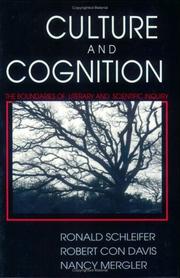
ISBN: 1501738526 0801426324 Year: 2019 Publisher: Ithaca, NY : Cornell University Press,
Abstract | Keywords | Export | Availability | Bookmark
 Loading...
Loading...Choose an application
- Reference Manager
- EndNote
- RefWorks (Direct export to RefWorks)
This groundbreaking book challenges the disciplinary boundaries that have traditionally separated scientific inquiry from literary inquiry. It explores scientific knowledge in three subject areas-the natural history of aging, literary narrative, and psychoanalysis. In the authors' view, the different perspectives on cognition afforded by Anglo-American cognitive science, Greimassian semiotics, and Lacanian psychoanalysis help us to redefine our very notion of culture.Part I historically situates the concepts of meaning and truth in twentieth-century semiotic theory and cognitive science. Part II contrasts the modes of Freudian case history to the general instance of Einstein's relativity theory and then sets forth a rhetoric of narrative based on the discourse of the aged. Part III examines in the context of literary studies an interdisciplinary concept of cultural cognition.Culture and Cognition will be essential reading for literary theorists, historians and philosophers of science; semioticians; and scholars and students of cultural studies, the sociology of literature, and science and literature.
Book
ISBN: 1000198650 042927971X 1000198812 9781000198812 9780429279713 9781000198652 9781000198737 1000198731 9780367234034 0367234033 9780367564377 0367564378 Year: 2021 Publisher: London Routledge, Taylor & Francis Group
Abstract | Keywords | Export | Availability | Bookmark
 Loading...
Loading...Choose an application
- Reference Manager
- EndNote
- RefWorks (Direct export to RefWorks)
Routledge Handbook of Counter-Narratives is a landmark volume providing students, university lecturers, and practitioners with a comprehensive and structured guide to the major topics and trends of research on counter-narratives. The concept of counter-narratives covers resistance and opposition as told and framed by individuals and social groups. Counter-narratives are stories impacting on social settings that stand opposed to (perceived) dominant and powerful master-narratives. In sum, the contributions in this handbook survey how counter-narratives unfold power to shape and change various fields. Fields investigated in this handbook are organizations and professional settings, issues of education, struggles and concepts of identity and belonging, the political field, as well as literature and ideology. The handbook is framed by a comprehensive introduction as well as a summarizing chapter providing an outlook on future research avenues. Its direct and clear appeal will support university learning and prompt both students and researchers to further investigate the arena of narrative research.--
Discourse analysis, Narrative. --- Narrative discourse analysis --- Narration (Rhetoric) --- Literary rhetorics
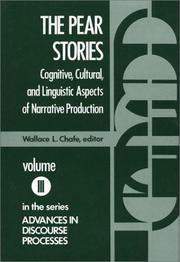
ISBN: 0893910325 Year: 1980 Volume: 3 Publisher: Norwood Ablex
Abstract | Keywords | Export | Availability | Bookmark
 Loading...
Loading...Choose an application
- Reference Manager
- EndNote
- RefWorks (Direct export to RefWorks)
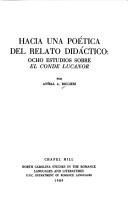
ISBN: 0807892378 9780807892374 9781469642680 1469642689 Year: 1989 Publisher: Chapel Hill, N.C. UNC Department of Romance Languages
Abstract | Keywords | Export | Availability | Bookmark
 Loading...
Loading...Choose an application
- Reference Manager
- EndNote
- RefWorks (Direct export to RefWorks)
Spanish literature --- Manuel, J. --- Discourse analysis, Narrative. --- Juan Manuel, --- Narrative discourse analysis --- Narration (Rhetoric)
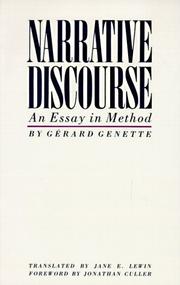
ISBN: 0801492599 9780801492594 Year: 1983 Publisher: Ithaca (N.Y.): Cornell university press
Abstract | Keywords | Export | Availability | Bookmark
 Loading...
Loading...Choose an application
- Reference Manager
- EndNote
- RefWorks (Direct export to RefWorks)
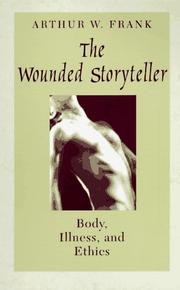
ISBN: 0226259935 9780226259932 Year: 1997 Publisher: Chicago (Ill.): University of Chicago press
Abstract | Keywords | Export | Availability | Bookmark
 Loading...
Loading...Choose an application
- Reference Manager
- EndNote
- RefWorks (Direct export to RefWorks)
Dans At the Will of the Body, Arthur Frank raconte l'histoire de ses propres maladies, de sa crise cardiaque et de son cancer. Le livre se termine par la description de l'existence d'une « société de rémission », dont tous les membres vivent avec une forme de maladie ou de handicap. The Wounded Storyteller est leur portrait collectif. Les malades sont plus que des victimes de la maladie ou des patients de la médecine, ce sont des conteurs blessés. Les gens racontent des histoires pour donner un sens à leur souffrance, quand ils transforment leurs maladies en histoires, ils trouvent la guérison. S'appuyant sur les travaux d'auteurs tels qu'Oliver Sacks, Anatole Broyard, Norman Cousins et Audre Lorde, ainsi que sur ceux des personnes qu'il a rencontrées au cours des années qu'il a passées au sein de différents groupes de malades, Frank raconte une collection émouvante d'histoires de maladies, allant de la célèbre bataille de Gilda Radner contre le cancer des ovaires aux témoignages privés de personnes atteintes de cancer, du syndrome de fatigue chronique et de handicaps. Leurs histoires sont plus que des récits de souffrances personnelles : elles regorgent de choix moraux et font référence à une éthique sociale. Frank identifie trois récits fondamentaux de la maladie : la restitution, le chaos et la quête. Les récits de restitution anticipent le rétablissement et accordent une place importante à la technologie de la guérison. Dans les récits de chaos, la maladie semble s'étendre à l'infini, sans répit ni perspectives rédemptrices. Les récits de quête visent à trouver cette vision lorsque la maladie se transforme en un moyen pour la personne malade de devenir quelqu'un de nouveau.
Sick --- -Discourse analysis, Narrative --- Narrative discourse analysis --- Narration (Rhetoric) --- Ill persons --- Persons --- Diseases --- Patients --- Psychology
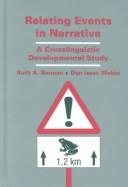
ISBN: 0805814353 Year: 1994 Publisher: Hillsdale Erlbaum
Abstract | Keywords | Export | Availability | Bookmark
 Loading...
Loading...Choose an application
- Reference Manager
- EndNote
- RefWorks (Direct export to RefWorks)
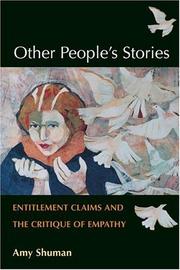
ISBN: 1283609126 9786613921574 0252092392 9780252092398 0252029631 9780252029639 0252077741 9780252077746 0252029631 9781283609128 6613921572 Year: 2005 Publisher: Urbana
Abstract | Keywords | Export | Availability | Bookmark
 Loading...
Loading...Choose an application
- Reference Manager
- EndNote
- RefWorks (Direct export to RefWorks)
Discourse analysis, Narrative. --- Narrative discourse analysis --- Narration (Rhetoric) --- Discourse analysis. --- Discourse grammar --- Text grammar --- Semantics --- Semiotics
Book
ISBN: 1282104233 9786612104237 9027289697 9789027289698 9789027226501 9027226504 9781282104235 6612104236 Year: 2009 Publisher: Amsterdam Philadelphia John Benjamins Pub.
Abstract | Keywords | Export | Availability | Bookmark
 Loading...
Loading...Choose an application
- Reference Manager
- EndNote
- RefWorks (Direct export to RefWorks)
Discourse analysis, Narrative. --- Oral history. --- History --- Oral biography --- Oral tradition --- Narrative discourse analysis --- Narration (Rhetoric) --- Methodology
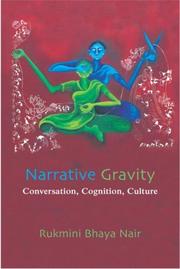
ISBN: 1134397925 0415754089 1280073063 0203301099 9780203301098 9786610073061 6610073066 9780415307352 041530735X 041530735X 9781134397921 9780415754088 9781280073069 9781134397877 9781134397914 0203349660 1134397917 Year: 2003 Publisher: London ; New York : Routledge,
Abstract | Keywords | Export | Availability | Bookmark
 Loading...
Loading...Choose an application
- Reference Manager
- EndNote
- RefWorks (Direct export to RefWorks)
In this elegantly written and theoretically sophisticated work, Rukmini Bhaya Nair asks why human beings across the world are such compulsive and inventive storytellers. Extending current research in cognitive science and narratology, she argues that we seem to have a genetic drive to fabricate as a way of gaining the competitive advantages such fictions give us. She suggests that stories are a means of fusing causal and logical explanations of 'real' events with emotional recognition, so that the lessons taught to us as children, and then throughout our lives via stories, lay the cornerstones
| Listing 1 - 10 of 248 | << page >> |
Sort by
|

 Search
Search Feedback
Feedback About UniCat
About UniCat  Help
Help News
News